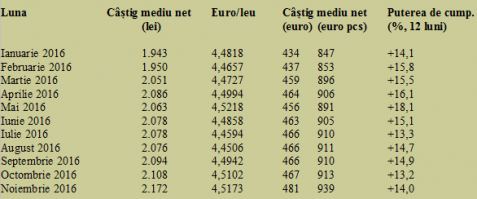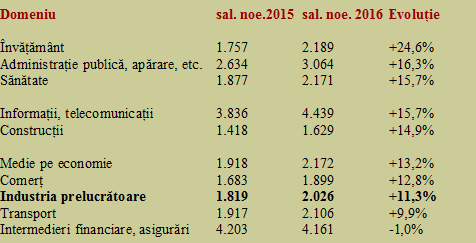 The average national gross salary announced by INS for November 2016 exceeded the psychological threshold of 3,000 lei by five lei, after an increase of 3% in the previous month. The average net wage had also a three percent advance and reached 2,172 lei or 481 euros, calculated at the average exchange rate from December, the month when money have actually been received.
The average national gross salary announced by INS for November 2016 exceeded the psychological threshold of 3,000 lei by five lei, after an increase of 3% in the previous month. The average net wage had also a three percent advance and reached 2,172 lei or 481 euros, calculated at the average exchange rate from December, the month when money have actually been received.
In terms of purchasing power, the real earning index climbed to 165.1% compared to the reference month of October 1990 (+ 4.8% compared to October 2016) and was by 14% higher than in November 2015. In pps equivalent (standard purchasing power parity, respectively adjusted to the domestic prices), the net salary increased to 939 euros.
This is the largest month-over-month increase since March, as can be seen from the data below, with the values updated to the Eurostat average price for the household spending, namely 51.2% of the EU average. It would also be noteworthy the return of the purchasing power compared to the last year after it had dropped in October to the lowest level in 2016.
*
- Month Average net earning (lei) Euro/leu Average net earning (euro)(euro pcs) Purchasing power (%, 12 months)
*
Although, the industrial labour productivity data, the benchmark for the whole economy, shows a decline of the labour productivity of almost one percent, as a monthly average of the first ten months of 2016. This way, an obvious gap deepens between the work outcome and the increase of the purchasing power.
Structure of increases at the national economy level
To get a picture of the structure of wage increases at the national economy level, we present the developments from several major areas of activity:
*
- Field of activity Salary in November 2015 Salary in November 2016 Change
- Education
- Public administration, defence, etc.
- Healthcare
- IT, communications
- Construction
- Average on economy
- Trade
- Manufacturing industry
- Transportation
- Financial intermediation, insurance
*
It is noteworthy the position of the manufacturing industry, which bore the brunt, below the average wage growth on the economy and below the trade sector. Also, the place of the increases from the public sector, significantly above those which, by the taxes paid, finance the salaries of the state employees.
It is also worth mentioning, as a change of principle in approaching the wage determination, education and, very close to the limit, the healthcare system repositioned above the average.
Somehow surprising, there is also a sector where the wages have decreased compared to the previous year, although they remain at a level almost double compared to the average of the economy, namely the financial intermediation and insurance. This is where outstanding loans and problems with the insurance sector had consequences not only for customers, but employees as well.











